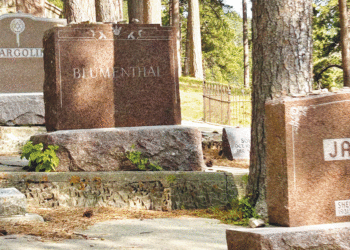In the way of review, in the previous AJW editorial, I mentioned that over “many years, epochal historical events have lined up with the High Holidays.” In the Sept. 12 edition, I mentioned the 1982 massacres of Palestinians in the Sabra and Shatila refugee camps, and the terrorist attacks on Sept. 11, 2001.
This week, President Barack Obama announced that the United States and its allies had expanded the bombing of ISIS (Islamic State in Iraq and Syria — also known as ISIL and the Islamic State), the violent extremists rampaging across Syria and Iraq.
The U.S. also took aim and fired at another, heretofore unknown, outfit called the Khorason Group, al-Qaida operatives said to be planning attacks against this country and other Western targets.
So, again in the run-up to the High Holidays, we have an escalating conflict in the Middle East to think about. By my count, the U.S. is flying drones and firing missiles in six countries now: Yemen, Somalia, Pakistan, Afghanistan, Iraq and Syria.
Perhaps some of these current events will become fodder for High Holidays sermons. When you get this edition of the AJW, it will be the days between Rosh Hashana and Yom Kippur. A provocative article, “Talk in Synagogue of Israel and Gaza Goes from Debate to Wrath to Rage,” in the Tuesday edition of the New York Times, suggests that rabbis likely will steer away from Israel as a topic for High Holidays sermons.
Too hot to handle, it turns out.
The Times story, by Laurie Goodstein, notes:
Forty-seven years after Israel’s victory in the 1967 Middle East war — celebrated by Jews worldwide — Israel’s occupation of Arab lands won in battle and its standoff with the Palestinians have become so divisive that many rabbis say it is impossible to have a civil conversation about Israel in their synagogues. Debate among Jews about Israel is nothing new, but some say the friction is now fire. Rabbis said in interviews that it may be too hot to touch, and many are anguishing over what to say about Israel in their sermons during the High Holy Days…
Particularly in the large cohort of rabbis who consider themselves liberals and believers in a “two-state solution,” some said they are now hesitant to speak much about Israel at all. If they defend Israel, they risk alienating younger Jews who, rabbis say they have observed, are more detached from the Jewish state and organized Judaism. If they say anything critical of Israel, they risk angering the older, more conservative members who often are the larger donors and active volunteers.
This last observation was amplified by Rabbi Jill Jacobs, executive director of T’ruah: The Rabbinical Call for Human Rights, a left-wing group with 1,800 members. Jacobs told the newspaper: “Rabbis are just really scared because they get slammed by their right-wing congregants, who are often the ones with the purse strings. They are not necessarily the numerical majority, but they are the loudest.”
The Times story mentioned that some rabbis did not want their names used, because they felt it would put their pulpit jobs at risk. “In a recent effort to quantify the phenomenon, one-third of 552 rabbis who responded to a questionnaire put outlast year by the Jewish Council for Public Affairs said they were reluctant to express their true views on Israel. (Most who responded were not Orthodox.) The ‘doves’ were far more likely to say they were fearful of speaking their minds than the ‘hawks,’” according to the newspaper.
This is unquestionably a dismal state of affairs in the American Jewish community.
If rabbis are averse to sharing their true feelings about Israel with their congregants, what will they talk about in shul?
“The easy sermon for a rabbi to give this year will be on the rise of anti-Semitism across the world. That is a softball,” Rabbi Jonathan A. Stein, a recently retired senior rabbi at Temple Shaaray Tefila in Manhattan, told the Times. Stein is also the immediate past president of the Central Conference of American Rabbis, the umbrella group of Reform rabbis.
“The more difficult sermon to give will be one that has any kind of critical posture,” Stein added.
The American Jewish World wades into the debate over Israel on a regular basis. For example, in this week’s edition, on the opposite page, we have published a statement by local Jews strongly critical of Israel’s Operation Protective Edge, the assault on Gaza, and of U.S. support for Israel.
AJW readers are invited to gainsay such viewpoints, or contribute words of support. This falls under the rubric of civil discussion within the Jewish community. It might not be happening in your synagogue; but in these pages, opinion makers can duke it out, figuratively speaking. “Let one hundred flowers bloom, let one hundred schools of thought contend,” as Mao Zedong said.
May all of our readers have an easy fast. G’mar chatima tova — may you be sealed in the Book of Life for a happy, healthy and peaceful year.
— Mordecai Specktor / editor [at] ajwnews [dot] com
(American Jewish World, 9.26.14)




















How telling that the your editorial does not even mention the High holiday sneak attack of the combined Arab armies against Israel in The Yom Kippur war of 1973!
Was this an oversight, or, left out because it does not fit your agenda?